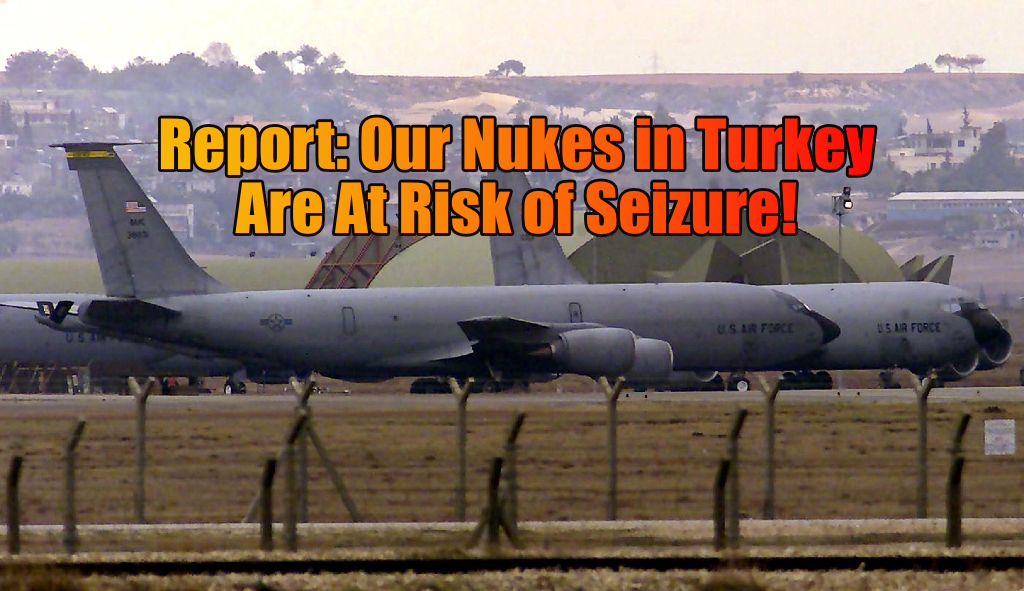
Turkey Declares Intent to Build Its Own Nuclear Arsenal
(October 22, 2019) — “Some countries have nuclear missiles, but the West insists we cannot have them. This is unacceptable”: This statement by President Erdogan reveals that the crisis goes beyond that opened with the Turkish offensive in Syria.
In Turkey, during the Cold War, the US deployed nuclear weapons against the Soviet Union. In 1962, in the agreements with the USSR for the solution of the missile crisis in Cuba, President Kennedy promised to remove these weapons from Turkey, but this was not done.
After the Cold War, about 50 US B-61 nuclear bombs (the same ones deployed in Aviano and Ghedi in Italy), mainly directed against Russia, remained in Turkey at the Incirlik airbase. Thus both the US and Turkey have violated the Non-Proliferation Treaty. Turkish pilots, in the framework of NATO, are trained (like the Italian pilots of the Ghedi base) to attack with B-61 nuclear bombs under US command.
Before long, the B-61 is to be replaced by the US also in Turkey (as will be done in Italy and other European countries) with the new B-61-12 nuclear bombs, also directed mainly against Russia. In the meantime, however, after the Turkish purchase of Russian S-400 anti-aircraft missiles, the US removed Turkey from the F-35 program, the main carrier of the B-61-12: the fighter that Turkey would have to buy 100 specimens and of which she was a co-producer.
“The F-35” declared the White House “cannot coexist with the anti-aircraft system S-400, which can be used to learn about the capabilities of the fighter” — i.e., it can be used by Russia to strengthen defenses against the F-35. By supplying Ankara with the S-400 anti-aircraft missiles, Moscow has managed to prevent (at least for now) that 100 F-35s are deployed on Turkish territory ready for attack with the new US B61-12 nuclear bombs.
At this point, it is likely that, among the options considered in Washington, there is that of the transfer of US nuclear weapons from Turkey to another more reliable country.
According to the authoritative Bulletin of Atomic Scientists (USA), “the Aviano air base may be the best European option from the political point of view, but it probably does not have enough space to receive all of Incirlik’s nuclear weapons”. However, the space could be obtained, given that in Aviano restructuring works have already begun to accommodate the B51-12 nuclear bombs.
This is the background to Erdogan’s statement that, also relying on the threatening presence of the Israeli nuclear arsenal, announces the Turkish intention to have its own nuclear weapons. Such a project is not easy, but it is not impossible.
Turkey has advanced military technologies, supplied in particular by Italian companies, especially Leonardo. It has uranium deposits. It has experience in the field of research reactors, supplied in particular by the USA. It has started the construction of its own nuclear power industry, purchasing some reactors from Russia, Japan, France and China.
According to some sources, Turkey may have already procured uranium enrichment centrifuges on the “nuclear black market”. The announcement by Erdogan that Turkey wants to become a nuclear power, interpreted by some as a simple upside game to have more weight in NATO, is therefore not to be underestimated. It discovers what is generally hidden in the media debate: the fact that, in the turbulent situation caused by war policies, the possession of nuclear weapons plays an increasingly important role, pushing those who do not possess them to procure them.
Translation by EAW. Posted in accordance with Title 17, Section 107, US Code, for noncommercial, educational purposes.

US Nuclear Weapons Stockpiled in Five Foreign States, on Bombers, and Submarines
In September 2009, Prime Minister Gordon Brown raised the prospect at the UN General Assembly of reducing the number of British nuclear-armed Trident submarines from four to three. Brown stated that “all nuclear weapons states must play their part in reducing nuclear weapons as part of an agreement by non-nuclear states to renounce them” and described his proposal as a “grand global bargain between nuclear weapon and non-nuclear weapons states.”[22]
As ever, any reduction in UK military forces was likely to be bitterly opposed in Washington.
A WikiLeaks publications shows that Julian Miller, the Deputy Head of the Foreign and Defence Policy Secretariat at the Cabinet Office, privately assured US officials that his government: “would consult with the US regarding future developments concerning the Trident deterrent to assure there would be ‘no daylight’ between the US and UK”.[23]
The idea that British decision-making on Trident is truly independent of the US is undermined by this cable.
Comments
Alice S. — We need to let the Times and others know that the US keeps nuclear bombs in five NATO states not just Turkey. We have them on bases in Germany, Italy, the Netherlands, and Belgium as well!
Clive — Also, the US, effectively, have nuclear weapons in Scotland (or on submarines which are based in Scotland). Although these are nominally ‘British’ nuclear weapons, the US own the missiles, which have to go back to Kings Bay, Georgia, to be serviced.
The US also own the satellites, without which, those nuclear missiles and their ‘multiply independently targeted’ warheads cannot be independently targeted. The Scottish Nationalist Party (SNP) who have the majority of MSPs in the Scottish Parliament, would like to evict those nuclear weapons from Scotland.
